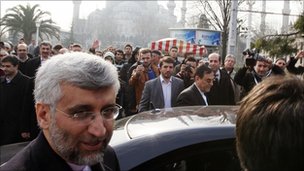 Foreign powers negotiating with Tehran on its nuclear programme say they are "disappointed" after a round of talks ended without progress in Istanbul.
Foreign powers negotiating with Tehran on its nuclear programme say they are "disappointed" after a round of talks ended without progress in Istanbul.
EU foreign policy chief Baroness Ashton, who led the international team, said Iran had sought to impose pre-conditions on any agreement.
While no date was set for new talks, she said the "door remained open".
Foreign powers had proposed a new version of a nuclear fuel swap, but Iran sought to discuss disarmament.
Iran's negotiator, Saeed Jalili, was due to make a statement on the outcome of the talks.
His team had sought to discuss regional security, but Western diplomats had wanted to discuss only the Iranian nuclear enrichment programme.
Western diplomatic sources spoke of anger and frustration over Iran's behaviour.
Baroness Ashton led a delegation from France, Germany, Russia, the UK, US and China, at the two-day talks.
The US and other Western powers say Iran is trying to develop a nuclear weapon, a charge Iran denies.
Revised deal
It was not immediately clear how the fuel swap plan might have been updated to make it more palatable to Iran.
Iran rejected the plan as proposed by Western and Russian negotiators in November 2009.
That proposal, brokered by the UN's International Atomic Energy Agency (IAEA), would have seen Iran sending 70% of its low-enriched uranium (fuel enriched to 3.5%) to Russia for re-processing into higher-grade (20%) fuel rods.
The fuel rods would have then been returned to Iran for use in a research reactor.
The plan was designed to stop Iran having an excuse to further enrich uranium, or work towards enriching to the degree necessary to make a bomb (90%).
Iran countered by offering to swap batches of low-enriched uranium for fuel rods but on its own soil.
Correspondents say Iran feared it might not get back its uranium and end up with no fuel rods at all.
The scheme began to look redundant last February when Iran announced it was itself enriching uranium to 20%.
The UN has imposed four sets of sanctions on Iran over the years.
While these have make it more difficult for Iran to acquire equipment, technology and finance to support its nuclear activities, they have not stopped trading in oil and gas - the major sources of Iran's income.



